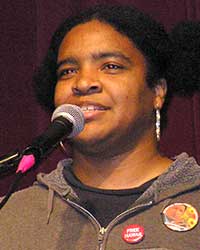Gender oppression & class society

Yolanda Carrington
From a talk given by Yolanda Carrington of Raleigh, N.C. FIST—Fight Imperialism, Stand Together—at the May 13-14 conference on “Preparing for the Rebirth of the Global Struggle for Socialism” in New York City.
I’m an African-American queer woman, born and raised in the South. I’m poor and I identify with the class struggle. I understand that I’m part of a larger global struggle of oppressed people rising up against imperialism, and I’m proud to be part of that struggle. It’s 10 percent of the people that own the means of production, that control the labor of all human beings, and I’m proud to be part of the 90 percent struggling against that. I’m committed to building the movement and a party that struggles for socialism and for the people to own the means of production, to own their labor.
The Research Triangle Park region is the richest, wealthiest, most highly educated region in North Carolina. We suck the wealth from the rest of the state. People migrate to the Triangle in search of work and most of the work they get is in the service industry—hotels, restaurants, bars. Or they end up homeless.
There needs to be a revolutionary party committed to socialism in the Triangle. I want a movement that’s out in the streets, that talks to the homeless people [and] single mothers struggling on the job, and goes into the welfare office. We need a movement that places the oppressed at the head of society.
The progressive movement [also] needs to put the struggle against gender oppression at the head of our movement, because gender oppression reinforces class society. People cannot get their basic needs because of who they love, how their gender expression is. Sometimes you can’t even get a job. That needs to change. The struggle against gender oppression needs to be central to our movement.
The Duke University case that we’re struggling against right now has really shown me the way. It blew open the contradictions for me in a huge way between class, race, gender, power—entrenched power and an institution that really leeches off the working class.
Duke University’s not just a school. It’s the hospital system. It’s one of the big charitable foundations in North Carolina. Duke is our empire in North Carolina. So it’s something that we struggle against, that entrenched power.

